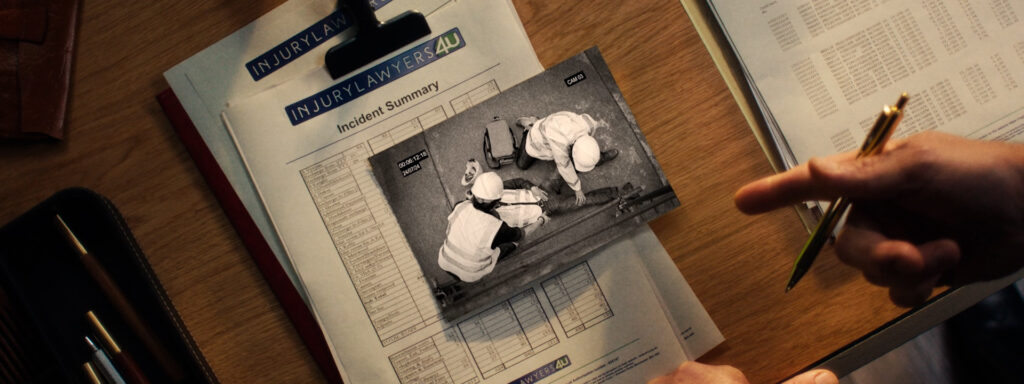Electric shocks can range from harmless jolts of danger to deadly or even fatal injuries. From muscle spasms to burns, electricity is a dangerous element both at home and in the workplace. In industrial settings especially, the presence of electricity can turn a normally safe environment into something deadly.
Whether it stems from faulty equipment, loose wiring or un-earthed machinery, the danger of electrocution can be present in areas you wouldn’t expect and can shock you to the point of personal injury. If you’ve suffered an injury from an electric shock caused either by a faulty product or another party’s negligence, you may be eligible to make an electric shock personal injury claim.

Electric shock injuries explained
Electric shock injuries occur when electricity passes through the body. Sometimes this is completely harmless, depending on the type of current, the level of voltage and current, the length of time the injured person is exposed and the path it takes through the body. However, electric shocks can cause all sorts of injuries to the body while it moves through it. The most common of these injuries include:
- Burns, both external and internal.
- Bone fractures, breaks and dislocations.
- Cardiac arrest.
- Muscle damage.
- Neurological damage.
- Organ damage.
- Secondary injuries (falls and trauma).
Am I eligible to make an electric shock compensation claim?
These accidents can occur anywhere if negligence is at play. Below, we’ll explore the most common locations you might be at risk, and how an outside party might be responsible for a potential electric shock injury.
Electric shock in the workplace
One of the most common places electric shock injuries occur is in the workplace. Whether it’s down to the negligence of your employer, lack of safety training and precautions or faulty machinery and equipment, the workplace is full of potential hazards. However these hazards present themselves, it’s the responsibility of your employer to keep you safe and adhere to the Electricity at Work Regulations 1989, the Personal Protective Equipment at Work Regulations 1992 and the Health and Safety at Work Act 1974.
If the worst has happened and you’ve been electrocuted at work, get in touch with Injury Lawyers 4u and we can begin to compile a case against your employer for negligence. And don’t worry, your employer legally can’t treat you any differently if you approach them with a claim for compensation, so don’t be deterred from seeking the justice you deserve.
Electric shock in a public place
Another common place that electric shock injuries can happen is in public spaces. Whether it’s in a shop, out on the street or even inside a hospital, it’s up to the owner of the space to keep you safe. This party has a duty of care to protect you, so if you encounter a loose wire or faulty piece of equipment left out that has damaged you with electricity, talk to us and we can put a case together against the negligent party.
Electric shock at home
In a rented home, the landlord is responsible for making the property safe and habitable. They must keep your home safe from electrical disaster in adherence to the Landlord and Tenant Act 1985 and the Electrical Safety Standards in Private Rented Sector (England) Regulations 2020. Under these regulations, landlords legally must now get the electrical installation checked every 5 years by a qualified professional. They must also prove to you that this has been done.
However, these regulations do not apply to social housing. If you are a council tenant or a tenant of a housing association, you must contact your housing provider if you have concerns about the home’s electrical safety. Additionally, the regulations do not cover tenants that live with a landlord (sometimes known as lodgers).
Electric shock from a faulty product
Electric shocks from faulty products are normally a rare occurrence because all suppliers are legally required to test their products before selling them to consumers. This is part of the Consumer Protection Act 1987. However, if you’re one of the unlucky few that has been injured by a defective product, we’ll assist you in making a claim against the equipment supplier.
Are electric shock injuries eligible for No Win No Fee?
Yes, at Injury Lawyers 4u, we operate all of our cases on a no-win, no-fee basis. This guarantees that you will only pay for our services if we successfully secure compensation for your electric shock injury. We operate the same way with all personal injuries that are caused by negligence. Ready to take on the party that caused your injury? Get in touch.

How much compensation can I get for an electric shock injury?
Every electrical shock injury claim is different, so the amount of compensation you may receive after a successful case will vary. This depends on the severity of the electrical injury and the impact it has had on your life following the accident.
However, to get a better idea of the general damages you should expect to see — these cover the injury itself — use our helpful compensation calculator. Special damages — these cover travel, physiotherapy or more esoteric costs — cannot be calculated as they vary case to case. For a better idea of the compensation you can expect to receive, get in touch with Injury Lawyers 4u today.
What evidence should I have for my electric shock injury compensation claim?
The best thing to do before approaching us with your claim is to gather as much useful evidence of your electric shock injury as you can. Here are a few key details to compile for your potential case:
- The date, time, and specific location of the accident.
- Details of the electric shock accident itself — this includes your account of what happened and who you believe was at fault.
- Contact and insurance information of all parties involved.
- Any available police reports documenting the incident.
- Photos or videos from the scene, which could include photos taken by you or CCTV from the scene.
- Contact details for any witnesses.
- Records of any medical treatment you received for your electrical injury, whether at the scene or afterwards at the doctor’s office or hospital.
If you approach us without some of these key pieces of evidence, don’t worry. We’ll help you to gather anything else we think will assist in the case.
Take the first step towards claiming electric shock injury compensation with us
Whether your electric shock injury is minor or severe, you deserve compensation for it. When you contact Injury Lawyers 4u, we’ll make it our mission to secure this compensation for you. We’re on your side and operate on a no-win, no-fee basis, so you won’t be charged until we win your case.
Ready to get started? Contact us via our quick contact form, or you can phone us directly on 0333 400 4445.
Frequently asked questions
Is an electric shock an injury?
Electric shocks are not technically injuries themselves, but the effect of the shock can directly cause many different types of injury. These range from burns to brain damage, depending on the severity of the shock.
What are the symptoms of an electric shock?
Electric shock symptoms can include burns, pain, muscle spasms, numbness, and tingling. You might also experience an irregular heartbeat, breathing problems, confusion, or even seizures. Injuries from falls are common too. Some effects, like weakness or memory issues, can show up later. It’s important to get medical help right away, as symptoms can worsen over time.
How are electric shock injuries treated?
Electric shock injuries are all treated differently depending on the severity and type of injury. For example, a burn would be treated very differently than a cardiac or neurological injury. Treatments for minor injuries will vary from prescribed pain medication, antibiotic ointment, and dressings to treat any minor burns to the skin. More severe injuries might include surgery, nutritional support, IV fluids, and in worst cases, resuscitation.
Do I need a lawyer to file an electric shock injury compensation claim?
You don’t need a solicitor to initiate an electric shock injury claim, but it is recommended. This is especially the case if you are bringing a case against an employer or landlord as it can be intimidating without professional legal support.
Will I have to go to court for my electric shock injury compensation claim?
Many injury claims are resolved through out-of-court settlements. However, if an agreement cannot be reached, the case proceeds to court, where a judge will make a ruling based on the presented evidence.

